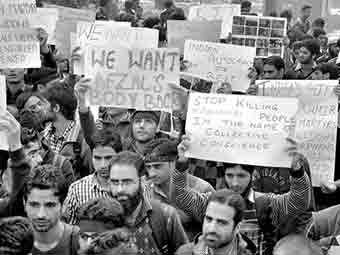The BJP is understandably in a gleeful mood that one of its key demands had been met, however ‘belatedly’. ‘Der aaye, durust aaye’ (better late than never), tweeted Narendra Modi. The Congress claims the execution proves its no-nonsense ‘zero tolerance’ stand on issues of terrorism. The dominant media, especially the big TV channels, are celebrating the two ‘back-to-back’ executions of Ajmal and Afzal, a media equivalent of the sweet distributing jingoistic celebration on the street. The CPI(M) too has chosen to join the chorus with Sitaram Yechuri describing it as a case of the law completing its due course in 11 years! Among political parties the lone voice of sanity has come from the CPI(ML) which described the execution as a travesty of justice and democracy and an act of appeasement of the communal-fascist brigade.

It is impossible to see the execution in a narrow legal framework and miss the political context and content that stare all of us in the face. It is well known that Afzal did not have a lawyer of his choice to represent him in the trial court and yet the courts passed adverse remarks against the police about the quality of investigation and evidence. When the Supreme Court upheld the capital punishment awarded by the trial court, it could not do so on strictly legal grounds – the evidence against Afzal had been only of a very weak circumstantial kind – and had to invoke the strange and dangerous argument that considering the enormity of the crime (the attack on Parliament), the collective conscience of the society will be satisfied only if capital punishment is awarded to the convict.
More crucially, Afzal has been hanged not just because the Supreme Court upheld the death penalty awarded to him by the trial court but because President Pranab Mukherjee rejected the petition for clemency lying with the President’s office since 2006. And the information of rejection by the President was kept absolutely secret to prevent Afzal from seeking a possible judicial stay on the ground of the delay in the process of disposal of his petition, a ground upheld by the Madras High Court in staying the execution of the three convicts who have been awarded death penalty in the Rajiv Gandhi assassination case. The Congress had earlier said the Afzal petition would be taken up after petitions from earlier dates had been disposed. Why was the queue suddenly jumped, and the execution carried out in such tearing hurry and shrouded in such supreme secrecy?
The fact that it was a political decision to hang Afzal Guru on the eve of the budget session with the 2014 Lok Sabha elections not too far away – the BJP says the Congress is in fact planning to hold it in advance – is clear to anybody who cares for facts and the truth that comes out of them. The government is only too aware of the political message this execution has sent out to Kashmir. This is why curfew was clamped down in Kashmir and newspapers stopped from being printed or uploaded online. Even chief minister Omar Abdullah, currently the closest ally of the Congress in Kashmir, has voiced his concern about the medium and long-term impact of this incident on the Kashmiri psyche. He has gone on record saying that the new generations of Kashmiris who may not identify with Maqbool Butt – the Kashmiri leader who was hanged and buried in Tihar jail on 11 February, 1984 after having spent years in jails in both India and Pakistan – will surely identify with Afzal Guru. He has also said that Kashmiris will consider this a case of selective execution unless the government also executes the people convicted in the cases of assassination of Rajiv Gandhi and former Punjab Chief Minister Beant Singh.
Omar and Manmohan Singh know it very well that even if the government were now to show parity in execution, the alienation of the average Kashmiri has been deepened immeasurably once again by this one single execution. Refusal to hand over the mortal remains to the family in the fear that Kashmiris will get another rallying point and turning Tihar jail into a graveyard for Kashmiris can only add to this deep sense of alienation, not lessen it. It is also no secret how soon after the hanging of Afzal Guru SAR Geelani (the Delhi University lecturer who had been arrested along with Afzal Guru as a ‘mastermind’ in the same 13/12 Parliament attack case and sentenced to death by the trial court before being acquitted by the Delhi High Court) and the journalist Iftikhar Geelani (jailed earlier on charges that proved later to be fabricated) were detained by the police, and mourners in Jantar Mantar including Kashmiri students and noted human rights activist Gautam Navlakha were allowed to be manhandled by a bunch of Bajrang Dal goons in full view of the Delhi Police.